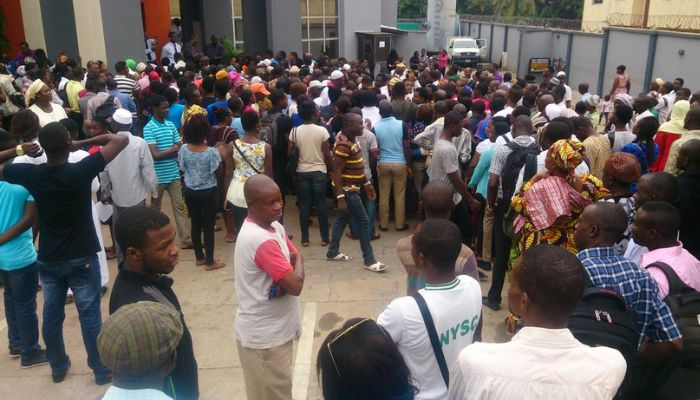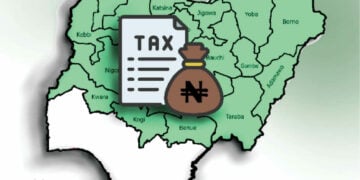Let me start this piece by stating that this columnist supports and supported the underpinnings of the naira redesign policy. I wrote severally and copiously in its support. But, as we say in Nigerian lingo, the CBN has fallen my hand!
The incompetence exhibited by the federal government’s CBN in this simple matter of naira redesign is mind numbing, mind boggling and mind fogging.
They made it appear as if it was a rocket science. A similar, change of currency was done by India, a country of over 1.3billion people with huge success.
It therefore beats one’s imagination that our own government institution like the Central Bank of Nigeria (CBN) messed up such a policy. A failure that has led to so much suffering for the ordinary Nigerian!
So many Nigerians have suffered so much and lost so much because of the poor implementation of the policy.
Already it has hurt the economy as the World Bank had feared. Recall that the World Bank had warned that the newly redesigned naira in Nigeria may have negative effect on economic activity especially on poor Nigerians due to its timing and short transition period.
The Washington-based bank revealed this in a new report titled, “Nigeria Development Update.”
This came amid the mixed reactions that have been trailing the newly redesigned notes. The report reads in part, “While periodic currency redesigns are normal internationally and the naira does appear to be due for it since naira notes have been redesigned for two decades, the timing of and short transition period for this demonetization may have negative impacts on economic activity, in particular for the poorest households.
“International experience suggests that rapid demonetizations can generate significant short-term costs, with small-scale businesses, and poor and vulnerable households, potentially being particularly affected due to being liquidity-constrained and heavily reliant on day-to-day cash transactions.
“At present, households and firms already face elevated financial pressures from prolonged, high inflation, recently compounded by external food and fuel price shocks, and the severe floods, and phasing out existing naira notes over a short time period may add to their challenges.”
As the scarcity of cash continues to bite harder, experts have warned that the national economy will suffer the long-term negative effects if nothing is done to address the situation urgently.
Following the redesign of the national currency and the withdrawal of the old currency notes, there has been scarcity of cash running into two months. The scarcity has forced many small businesses, which depend on cash transactions, to shut down while citizens are faced with difficulty accessing cash for their daily expenses.
Director of the Centre for the Promotion of Private Enterprise (CPPE), Dr Muda Yusuf, reportedly said the cash crunch is slowing down economic activities and taking a heavy toll on small businesses.
He said one had expected that the situation would improve after the presidential election, but that has not happened, adding that it has continued to slow down economic activities and it is taking a very heavy toll on the small businesses, on those in the rural areas and it is also taking a huge toll on the agricultural sector.
He said these are very huge and strategic constituents of the economy, because of their contributions to job creation, economic inclusion and their contributions to economic diversification.
Yusuf said the cost to the economy and the welfare of the people is enormous and it will drag down the gross domestic product (GDP), leading to the contraction of the economy as job losses, adding that the damage is far higher than whatever benefit people might want to ascribe to it, noting that the CBN cannot arbitrarily cut the amount of cash in the economy.
Others have said that the informal sector of the economy has been the worst hit by the cash scarcity. The informal sector is a very huge contributor to our national GDP and they are very badly affected by the cash crunch, people that on a normal day do not have access to cash, you can imagine what they are going through now, because most of the businesses in the informal sector are cash based. Patronage has dropped very significantly because people do not have cash to buy things. This cash crunch has slowed down production and consumption of goods and services in the country. An unending cash crunch is negative for any economy, talk much more of an economy in dire straits such as Nigeria!
One of the reasons given is the effort to drive up and force more people into the use of online banking services, which is indeed good for our economy, unfortunately, there have been so many complaints about failed and hanging transactions. There is hardly any day without complaints in the banking halls across the country. You will see people shouting with regard to transfer failures. Very many man-hours are lost by Nigerians chasing cash in the banks and in the nooks and crannies of the black market! This is an additional to the woes of Nigerians.
The Lagos State chairman of the Nigerian Association of Small and Medium Enterprise, Dr Adebayo Adams, reportedly said the policy had hit businesses and the MSMEs hard. All over the country small businesses are closing down and even the big ones are struggling to raise their head above the water and salary payment has become a big challenge.
Yet the suffering of Nigerians means nothing to those saddled with the responsibility of addressing the situation. Not even the Supreme Court directing them to make old N500 and N1000 notes legal tender till December 31, 2023 could make them wake up from their slumber. However, it took the threat by the Nigeria Labour Congress (NLC) to occupy CBN offices nationwide for the apex bank to rise from its lethargy.
Recall that the NLC threatened to shut down all Central Bank of Nigeria (CBN) offices nationwide this week over the inability of the apex bank to make cash available for Nigerians. The protest, which was expected to start this week, followed the expiration of the seven-day ultimatum given to the federal government by the Congress, for the CBN and commercial banks in Nigeria to end the current cash crunch.
NLC national president, Comrade Joseph Ajaero, told journalists at a briefing in Abuja, that the decision was necessary after the ultimatum issued last week had ended. Sensing that the NLC leadership means business it was reported that the CBN officials quickly arranged meeting with the comrades. The result was the CBN evacuating banknotes from its vaults to commercial banks across the country as part of a coordinated effort to ease the circulation of banknotes of various denominations.
The CBN also directed all commercial banks to open for operation on Saturdays and Sundays. The Acting Director, Corporate Communications Department of the CBN, Isa AbdulMumin, on Friday last week stated that a substantial amount of money, in various denominations, had been received by the commercial banks for onward circulation to their respective customers.
According to him, the CBN had directed all banks to load their Automated Teller Machines (ATMs) as well as conduct physical operations in the banking halls through the weekends.
“Branches of commercial banks will operate on Saturdays and Sundays to attend to customers’ cash needs,” he noted, adding that the Governor of the Central Bank of Nigeria, Godwin Emefiele, would personally lead teams to monitor the level of compliance by the banks in various locations across the country.
He, therefore, urged Nigerians to be patient as the current situation would ease soon with the injection of more banknotes into circulation.
Has the situation eased? Of course not. The cash crunch is still biting hard and naira has continued to be used to buy naira with reports that people are still paying as much as N2000 to get N10,000 old naira notes. Right now, no one is talking about the new naira notes. Thank God the old naira notes are back, but where is it? Despite the claims by the CBN that it had evacuated cash to commercial banks the fact remains that the banks are overwhelmed by the crowd of Nigerians looking for cash.
Truth be told if there is enough cash from CBN the crowds at the commercial banks would have reduced drastically but the reverse is the case! The crowds at all banks are the unambiguous statement that the CBN has failed to supply enough cash, be it old or new currency denominations. This incompetency continues at a huge cost to the economy.
MAY NIGERIA REBOUND





